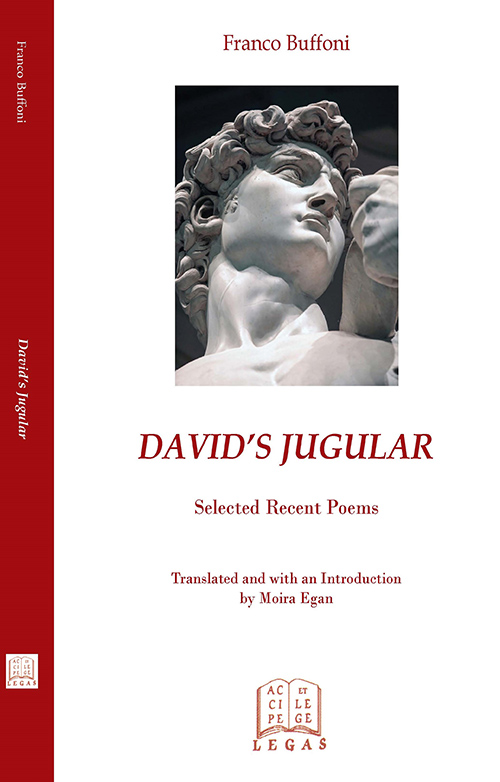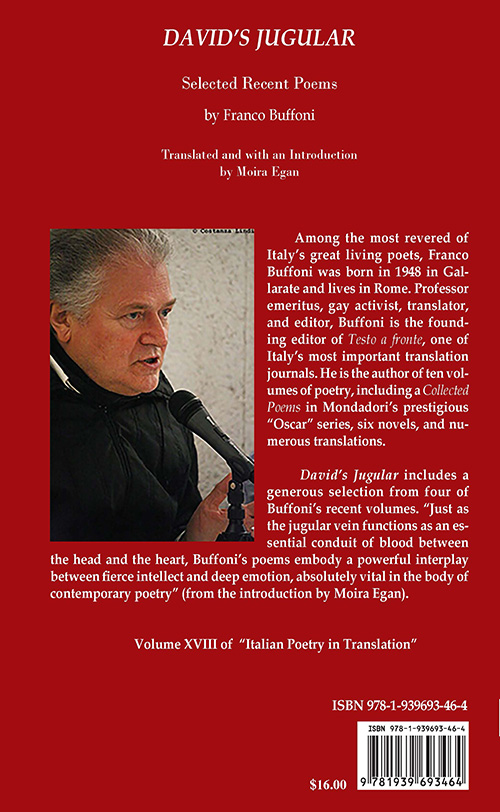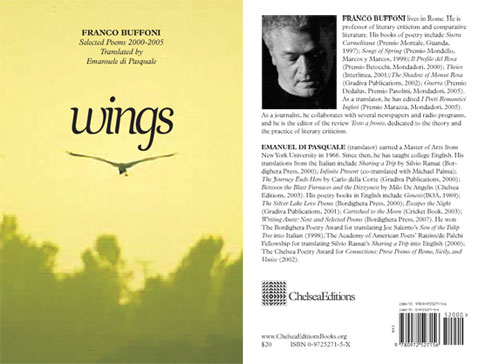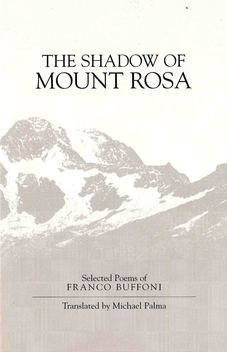DAVID’S JUGULAR


Journal of Italian Translation Spring 23 the review of Giulio Medaglini
TEMPO: EXCURSIONS IN 21ST CENTURY ITALIAN POETRY
Edited by Luca Paci, ParthianBooks.com, Apr 2022
Per visualizzare il sommario clicca qui
- Specimen. The Babel Review of Translation: Island Triptych
- Today on Poetry Daily Oct. 10 2022
- World Poetry Tree. An Anthology, ed. by Adel Khozam, Almaseerah Media, Dubai 2021, p 227-229 two poems translated by Moira Egan
- Manuel J. Ellul – Joanne Cassar “Franco Buffoni’s Novel Zamel” in The International Journal of Critical Cultural Studies 19/2
- Six Poems in Journal of Italian Translation XVII, Autumn 2022 translated by Moira Egan, Raphael d’Abdon, Johanna Bishop, Barbara Ungar.
- The Central Role of the Concept of Rhythm, in Specimen 14-08-21
- 3 poems from Betelgeuse tr by Moira Egan – Recent Work Press
- English/Italian Reading 21-03-21
- Inkroci - Mothers’ Tongues
- Rafael d’Abdon traduce Dolce vita
- Biserta translated by V. Meloni - R. Dastidar
- Two poems translated by Johanna Bishop and Barbara Ungar
- Three poems translated by Richard Dixon Rossocorpolingua 4th dec 19
- Five chosen poems
- Buffoni speaks of Leopardi translated
- An Endless End, An Anthology California IS
- Moira Egan - Columbia University Journal
- Christopher Atwood essay for Routledge
- Christopher Atwood abstract
- Poetry Foundation - Geoffrey Brock
- Reading Rome Massenzio
- Journal of Italian Translation
- Italian Contemporary Poets. An Anthology
- Beyond Thirty-Nine Interview
- New Translations by Richard Dixon
- Interview: five answers to P. Pancamo
- Collected Poems from Noi e loro
- Jacob Blakesley, 2014 Toronto U.P.
- Richard Dixon translates Buffoni
- J. Blakesley, Modern Italian Poets, Toronto U.P.
- Poetry Foundation
- Translations Studies Journal. Vernacular Experiment
- Writing Translating Publishing – Manchester Conference June 25th
- Geoffrey Brock translates Buffoni for “Poetry”
- 9 Poems from “Roma” translated by Jacob Blakesley
- Jacob Blakesley, “Franco Buffoni, The Poietic Encounter”
- Franco Buffoni racconta Mario Praz

Click here to read the first part of the book (Re-opened House)
Click here to read “World Literature Today” Review
John Taylor, A Little Tour through European Poetry, Transaction, New York 2014
Franco Buffoni was born in Gallarate (Lombardy) in 1948. He lives in Rome. He is a full professor of literary criticism and comparative literature. For 30 years he has taught in the universities of Parma, Bergamo, Milano IULM, Torino, and Cassino. Some of his books of poetry are:
- “Suora Carmelitana” (Montale Award, Guanda, 1997);
- “Songs of Spring” (Mondello Award, Marcos y Marcos, 1999);
- “Il Profilo del Rosa” (Betocchi Award, Mondadori, 2000);
- “Guerra” (Dedalus Award, Mondadori, 2005).
- “Noi e loro” (Marino Award, Donzelli, 2008)
- “Roma” (Giuseppe Giusti Award, Guanda 2009)
- "Poesie 1975-2012" (Oscar Mondadori, 2012, pp 400)
- "Jucci" (Castello di Villalta Award, Mondadori 2014)
Some parts of these books have been published in Spain, Germany, the Netherlands, and England. Two full-length collections have appeared in the United States and in France. In 1989 he founded and he is still the editor of the review Testo a Fronte, dedicated to the theory and the practice of literary translation (Marcos y Marcos). As a translator he edited I Poeti Romantici Inglesi, (Mondadori, 2005). As an essayist he published Ritmologia (Marcos y Marcos, 2002), La traduzione del testo poetico (Marcos y Marcos, 2005), Con il testo a fronte. Indagine sul tradurre e l’essere tradotti (Interlinea, 2007), and Laico Alfabeto (Transeuropa 2010). As a novelist he published Più luce, padre (Luca Sossella Editore 2006), Zamel (Marcos y Marcos 2009), Il servo di Byron (Fazi 2012), La casa di via Palestro (Marcos y Marcos 2014). As a journalist he collaborates with several magazines and radio programs.
- Franco Buffoni, about my work in poetry
- About Buffoni as a translator of S.T. Coleridge
- Paolo Bartoloni, in Heat 8, Australia's International Literary Quarterly
- Franco Buffoni, On Poetry
- Translations from Buffoni’s works. The complete list.
Michael Palma about Franco Buffoni
 Franco Buffoni has been published in several anthologies of contemporary Italian poetry and is the recipient of various literary prizes, including the Premio Sandro Penna (1991), Premio Montale (1997), and the Premio Mondello (1999). His poems have been translated into Dutch, English, French, German, and Spanish. Over the past two decades, Franco Buffoni has become one of the best-known and most highly regarded contemporary Italian poets. Ranging from four lines to four pages, from lyrical tenderness to caustic wit, combining traditional poetic values with striking originality, his sober, measured and conversational poems appeal to a broad spectrum of readers.
Franco Buffoni has been published in several anthologies of contemporary Italian poetry and is the recipient of various literary prizes, including the Premio Sandro Penna (1991), Premio Montale (1997), and the Premio Mondello (1999). His poems have been translated into Dutch, English, French, German, and Spanish. Over the past two decades, Franco Buffoni has become one of the best-known and most highly regarded contemporary Italian poets. Ranging from four lines to four pages, from lyrical tenderness to caustic wit, combining traditional poetic values with striking originality, his sober, measured and conversational poems appeal to a broad spectrum of readers.
I first encountered Franco Buffoni's poetry in his Adidas: poesie scelte 1975-1990. In this volume of selected poems, brief texts, some of which been written years apart, were combined into a number of sequences. Although his short lines, epigram-like stanzas and compressed style were at the furthest remove from the practice of Walt Whitman, I was nonetheless reminded of Leaves of Grass by Buffoni's apparent sense of his own poetry as a fluid, developing body of unified work. The larger thematic connections within these sequences were not always clear to me, but from my very first acquaintance with his work, I was intrigued by Buffoni's turns of mind and turns of phrase, and by his patterns of association and organization. My admiration for these qualities grew stronger as I read his individual collections in chronological order, and it was enriched with an ever-deepening understanding of his subjects and themes.
One of those subjects is himself. Always an element in Buffoni's poetry, autobiography has been increasingly emphasized as he has moved from book to book, to the point where his latest – and largest – collection, Il profilo del Rosa, gathers over one hundred personal lyrics into six thematically unified groupings, thus creating a volume even more reminiscent of Whitman than was Adidas. But in Buffoni's poetry this foregrounding of the self is not so solipsistic an enterprise as it is in the work of many other writers, since the self presented in his work is one characterized by cultural and historical curiosity, by political and moral consciousness, and by an individual and often quirky sensibility that is fueled by a rich appreciation of the labyrinths of human personality.
Buffoni's stance is often that of an outsider, an outlook intensified by his sense of being marginalized because of his sexual identity. Unsurprisingly, he has waged an ongoing battle with the Catholic Church, as can be seen in such poems as "Antiquated Abstinence," "Lafcadio," and the extremely popular "Carmelite Sister." In the last of these, however, we see that as he grows more at ease with himself, the forces oppressing him diminish in size and strength, and there is less need to lash out: "I don't lie now about myself, I sit and listen." Despite the increased air of self-confidence, he retains a satirical edge that is displayed to particularly good effect in the dry and biting "If you don't know what it means in English to maroon." And it should also be noted that, in contrast to the lugubrious self-importance of far too many poets, Buffoni can be amusing and even hilarious, as he is in "Hayseed Airbase," a poem which, unfortunately for those who are concerned about such things, will do absolutely nothing to dispel the stereotype of Italians as militarily hopeless.
Michael Palma

Poems
- Like a Polyptych
- Lafcadio
- Of Poetry
- I'd like your world of painted puppetry
- Greater Germany
- The Pergusa Speedway
- If you don't know what it means in English to maroon
- Carmelite Sister
- Techniques of criminal investigation
Publications
- Wings - Selected Poems 2000-2005, full lenght book translated by Emanuele di Pasquale, Chelsea editions, New york 2008. www.ChelseaEditionsBooks.org
- “Techniques of criminal investigation” and other poems translated by Micheal Palma, in New European Poets, edited by Wayne Miller and Kevin Pruffer, Graywolf Press, Saint Paul, Minnesota, 2008. www.graywolfpress.org
- “From Mars cruel god of war”, translated by Geoffrey Brock, in Poetry CXCI number 3, december 2007. www.poetrymagazine.org
- The Shadow of Mount Rosa - Selected Poems 1979-1999, full lenght book translated by Michael Palma, Gradiva Publications, Stony Brook, New York 2002
- “The Re-opened House” and other poems translated by Elaine Feinstein, in Modern Poetry in Translation n 15, ed Daniel Weissbort, King’s College London 1999
- What’s poetry for me (F. Buffoni)
- Celia Filipetto: Buffoni translated in Spanish
- Johanna Bishop: recent poems translated in English
- Michael Palma: poems translated in English
- Michael Palma: poems translated from The Shadow of Mount Rosa
- Michael Palma: Other poems from The Shadow of Mount Rosa
- Susanne Lippert: Karmeliter Nonne (in German)
- Michael Palma: English version of Carmelite Nun
- Martha Canfield: Other Poems translated in Spanish
- Carolina Castellary: some poems from ROMA in Spanish
- Four Poems translated by Justin Vitello
- Six poems in Swedish translated by Ragnar Stromberg
- Swedish Radio Reading 1997
- Vernacular Experiment – University of California March 2012
- Richard Dixon translates Franco Buffoni 2013
- Italian Poetry in German
- Carolien Steenbergen translates Buffoni in Dutch
- Juan Carlos Reche translates Buffoni in Spanish
- Caroline Lüderssen, 3 poems in German from O Germania
- Jesus Diaz Armas Guerra in spagnolo
REVIEWS
- Paolo Valesio – YIP Yale Italian Poetry
- Barbara Carle – Chelsea
- Michael Palma – Translator’s Note
- Alejandro Patat, La Nacion Buenos Aires
- Tes Nehuén, “La poesia de Franco Buffoni”, in Poemas del Alma 02-10-19
- Jorge De Arco su Andaluciainformacion 26-06-20
Franco Buffoni, da Il profilo del Rosa
Era solo una voce di mamma per le scale
“Piano”, diceva, e si sentiva un frigno
Non forte di tre quattro anni
E passi scolpiti al gradino
Diversi, grandi fruscianti
E piccoli pesanti.
Forse c’era ancora un po’ di neve
Addossata al muretto davanti
O comunque del bianco tra le ortensie,
“Piano”, ripeteva la voce
nella traduzione inglese di Valentina Melloni:
It was just a mom's voice on the stairs
"Slowly", she said, and you could hear a grimace
Not strong, of about three four years,
And different treads, carved
To the step, some large and rustling
Some others small and heavy.
Maybe there was still some snow
Piled against the wall in front
Or at least the white among the hydrangeas,
"Slowly" the voice repeated



